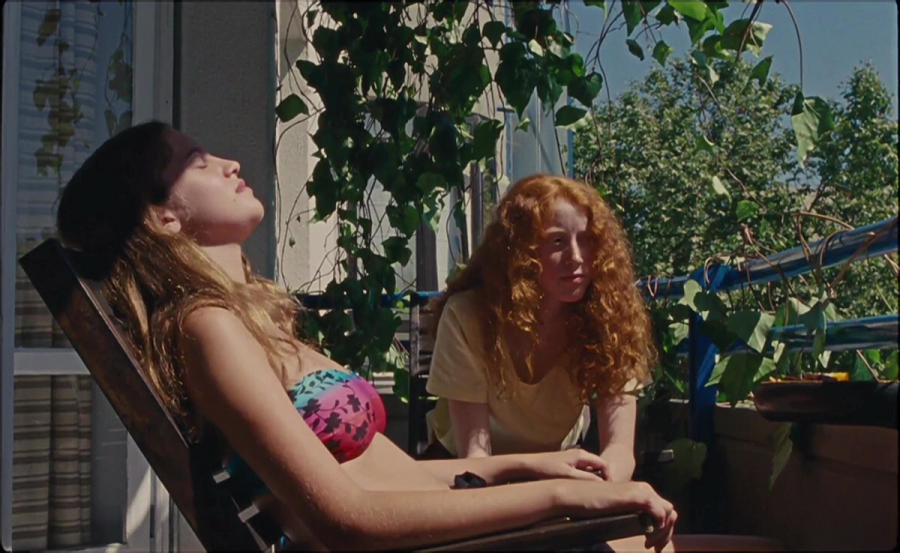John From – Slacker
John From (2015), the debut film of Portuguese director João Nicolau, is the perfect film to watch during these strange summer months, with their canceled vacation plans and the inability to see anything beyond the next door high-rise, months unlike any others we’ve seen before. Here is a pre-pandemic film that examines the summertime languor inside a residential neighborhood in Lisbon, following the lives of a couple of teenage girls that have nothing better to do but listen to music, go to a house party every once in a while or sunbathe for the better part of the day. There’s no going to a festival or to the beach, no sudden stunt: Nicolau seems to literally employ the concept of a topicless film, of the “world in which nothing ever happens” – and the certainty with which he chains together the film’s languishing shots, without feeling the pressure to step on any speed pedal that is aching to be finally pushed, goes to show that the filmmaker has already found his own voice. And it’s with this composed and self-assured voice that we are told that any escape or escapade on part of the teenagers requires quite an effort. There’s nothing more alien to this universe than the concept of a deus ex machina which would “miraculously” offer the characters any sound reason to wake up in the morning.
Just as its protagonist, Rita (Julia Palha), makes use of this dolce far niente to discover herself in terms of love affairs – without this discovery being in any way sugar-coated – the film uses it to construct its own universe made up of almost indistinguishable houses, concrete streets emptied by the sweltering afternoon sun, parking lots and supermarkets. One would think that not even a gust of wind would come to disturb this ultra familiar geography of routine spaces. Still, following in the steps of the traditions of Portuguese cinema, Nicolau knows how powerful the illusion of a hyperreal world carefully set in front of the camera can be, just as well as he knows that it’s necessary for us to discover, specifically from within this world that doesn’t hold any promises, a fantasy that is capable of transporting our mind far away. Just as with Manoel de Oliveira or João Pedro Rodrigues, the more plausible this initial world seems, the more it tenderly lures us into thinking of our own experiences, even more so it’s vehemently denied in favor of a compensatory phantasm.

It’s enough to take a look at the script’s main hook, which sets the mental journey in John From into motion: while visiting a neighborhood cultural institute where she spends her time every now and then, Rita stumbles upon an exhibition about a faraway land, Melanesia. Coincidentally, the pictures belong to a neighbor who’s recently arrived in the area: what better way to use one’s imagination to travel to the other side of the world while making a couple of amorous pit-stops along the way? The story’s lack of any real stakes – which goes something along the lines of “if it doesn’t work, that’s that, but maybe something’s gonna come out of this…” – allow the film to fly away from the naturalistic bog which threatens to sink it, and onto the much more promising terrains of unbound fantasy, where everything is possible. Learning about a region that she knew nothing about (that is how she finds about about the cult that an American paratrooper from the Second World War, who introduced himself as John from… America, enjoys a cult on the islands) and hoping to at least flirt with the photographer, Rita finds a summertime motivation, even if it’s a pretty slim one. Following in her tracks, the film can abandon any anchors into reality, in order to sink deeper and deeper into the world of pure reverie. As one famous saying of French film critic Michel Mourlet goes, “cinema replaces our gaze with a world in harmony with our desire”.
If Mourlet was indeed right, then John From is definitely cinema. Its force lies in the easiness of its tone – along the lines of “nothing more simple than that” – which offers all the credit in the world to a teenage mind which is tasked with conceiving alternative worlds and with putting together scripts that finish on a happy end. Paying close attention to the teenage inside jokes – the two girls greet each other with „Paulo Rodrigo” – and their deadpan humor, the film describes a world that is slightly out of touch (we don’t really see any cellphones around), in which jokes like these had their own rationale: they were the means by which a fragile privileged bubble would be constructed, one which would only serve its initiators and separate them from “loser grown-ups”. Without betraying the luminous ingeniousness of his vision, João Nicolau proves that anyone can reach for a phantasm in order to escape from the fervid idleness of summertime: it’s enough to use a bit of smoke that engulfs the shot from all sides and a couple of rudimentary special effects to transform the abandoned field that’s next to the high-rise building into a Garden of Babylon, crossed by channels of crystal-clear waters. From now on, in the digital world, daydreaming knows no more limits.
John From is available on MUBI.
Title
John From
Director/ Screenwriter
João Nicolau
Actors
Julia Palha, Clara Riedenstein, Filipe Vargas
Country
France, Portugal
Year
2015
Film critic and journalist; writes regularly for Dilema Veche and Scena9. Doing a MA film theory programme in Paris.


